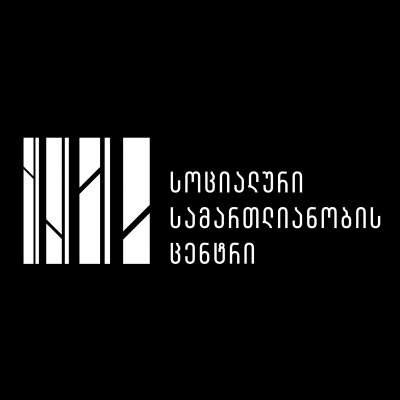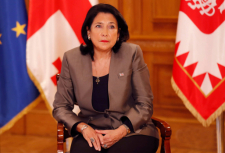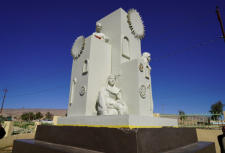A brief essay from the report of the "Center for Social Justice" on "The participation of ethnic minorities in political life is still a serious problem"

The participation of ethnic minorities in the political life of Georgia is a serious problem, for example, their representation in the Parliament is small. The situation in this direction has deteriorated sharply after the 2020 elections. The number of representatives of ethnic minorities in the Parliament after the 2020 elections is 6 deputies. In 2016, these data were 11, and in 2012-8. However, even in 2016, when the number of deputies from ethnic minorities in the parliament was the highest in recent years (7.3%), this is still twice as much as the number of ethnic minorities (13.2 %) in the total population.
The representation of ethnic minorities is sharply lower even at the level of councils of municipalities densely populated by ethnic minorities. A 2017 CSEM study shows that even in 8 municipalities densely populated with ethnic minorities, ethnic minorities are much less represented at the council level. On average, 779 ethnic Georgians in these municipalities have one representative in the city council, while 1116 ethnic Armenians and 2945 ethnic Azerbaijanis have one representative each.
Despite the difficult situation, the State does not have special policies and mechanisms that would facilitate the employment of ethnic minorities and create preferential conditions in the process of their employment in the civil service. Given the sharp shortcomings in education in the Armenian and Azerbaijani sectors, including the quality of teaching the state language, this situation becomes an unfair burden for ethnic minorities.
It is obvious that the alienation of ethnic minorities from political processes and State institutions, their low trust, repression and participation in institutional processes significantly damage the construction of an inclusive democracy in our country. In addition, the low ability to influence the political agenda and decisions of State bodies worsens the rights and social situation of ethnic minorities and makes them vulnerable.
Political participation is an important tool for integration and the creation of dialogue, cooperation and unity between communities, but, unfortunately, after Georgia gained independence, our political elite could not create such unifying political projects and processes that would become open, common and unifying for various ethnic, religious and cultural groups. A CRRC survey for 2021 shows that 47% of the population believe that the separatist wars that occurred after independence in Georgia show that representatives of ethnic and linguistic minorities are a "potential security threat" for the country. According to the same study, for a significant part of the population, Georgian citizenship will be divided into language, religion and Georgian: 91% of the population believes that a Georgian citizen should know Georgian, 50% want him to be an Orthodox Christian, and 30% say that he should only be Georgian.
Unfortunately, ethno-religious nationalism remains the leading and main basis of our collective self-identification, and it creates permanent social hierarchies between different groups. It is true that the alienation of citizens from political processes in the conditions of the current political crisis and the discrepancy between the needs of the population and the political agenda is a common feature of our political system and reality, but the political participation of ethnic minorities is hindered by a number of structural reasons that should motivate the state and political groups to continue, unfortunately, these issues do not become part of the political agenda, and interest in this regard is low in almost all political parties.
Source-Center for Social Justice
The full report can be found below at the link:
Tags: #yazidisinfo #newsgeorgia #nationalminorities
A brief essay from the report of the "Center for Social Justice" on "The participation of ethnic minorities in political life is still a serious problem"

The participation of ethnic minorities in the political life of Georgia is a serious problem, for example, their representation in the Parliament is small. The situation in this direction has deteriorated sharply after the 2020 elections. The number of representatives of ethnic minorities in the Parliament after the 2020 elections is 6 deputies. In 2016, these data were 11, and in 2012-8. However, even in 2016, when the number of deputies from ethnic minorities in the parliament was the highest in recent years (7.3%), this is still twice as much as the number of ethnic minorities (13.2 %) in the total population.
The representation of ethnic minorities is sharply lower even at the level of councils of municipalities densely populated by ethnic minorities. A 2017 CSEM study shows that even in 8 municipalities densely populated with ethnic minorities, ethnic minorities are much less represented at the council level. On average, 779 ethnic Georgians in these municipalities have one representative in the city council, while 1116 ethnic Armenians and 2945 ethnic Azerbaijanis have one representative each.
Despite the difficult situation, the State does not have special policies and mechanisms that would facilitate the employment of ethnic minorities and create preferential conditions in the process of their employment in the civil service. Given the sharp shortcomings in education in the Armenian and Azerbaijani sectors, including the quality of teaching the state language, this situation becomes an unfair burden for ethnic minorities.
It is obvious that the alienation of ethnic minorities from political processes and State institutions, their low trust, repression and participation in institutional processes significantly damage the construction of an inclusive democracy in our country. In addition, the low ability to influence the political agenda and decisions of State bodies worsens the rights and social situation of ethnic minorities and makes them vulnerable.
Political participation is an important tool for integration and the creation of dialogue, cooperation and unity between communities, but, unfortunately, after Georgia gained independence, our political elite could not create such unifying political projects and processes that would become open, common and unifying for various ethnic, religious and cultural groups. A CRRC survey for 2021 shows that 47% of the population believe that the separatist wars that occurred after independence in Georgia show that representatives of ethnic and linguistic minorities are a "potential security threat" for the country. According to the same study, for a significant part of the population, Georgian citizenship will be divided into language, religion and Georgian: 91% of the population believes that a Georgian citizen should know Georgian, 50% want him to be an Orthodox Christian, and 30% say that he should only be Georgian.
Unfortunately, ethno-religious nationalism remains the leading and main basis of our collective self-identification, and it creates permanent social hierarchies between different groups. It is true that the alienation of citizens from political processes in the conditions of the current political crisis and the discrepancy between the needs of the population and the political agenda is a common feature of our political system and reality, but the political participation of ethnic minorities is hindered by a number of structural reasons that should motivate the state and political groups to continue, unfortunately, these issues do not become part of the political agenda, and interest in this regard is low in almost all political parties.
Source-Center for Social Justice
The full report can be found below at the link:
Tags: #yazidisinfo #newsgeorgia #nationalminorities

























